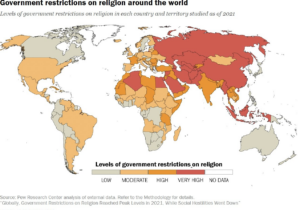When Egypt was negotiating with Israel to reach a peace agreement, which the two countries signed in 1979, Egyptian President Anwar Sadat refused to appoint Boutros Ghali, a Christian, as minister of foreign affairs. Instead, Sadat made sure that Ghali was in a lower position to prevent him from being in charge of Muslims, despite his high credentials and pivotal role in reaching the agreement. Decades later, Christians and other religious minorities in Egypt still face numerous barriers to equality. But now many writers and journalists challenge their marginalization, and they often find themselves facing serious risks to their lives or freedom. This group of Egyptian thinkers has contested these practices and argued openly that restrictions against Christians ought to be repealed.
Among them is Ibrahim Issa, a well-known journalist who received death threats for his opposition to the Muslim Brotherhood and Gama’a al Islamiya groups. He has challenged a wide array of Islam-related concepts. Often, he rejected exonerating Islam from crimes like those committed by ISIS and blatantly compared the controversial Muslim scholar Ibn Taymiyah, whose teachings are considered the driving force for violence against non-Muslims, to Hitler.
Issa was hired in March 2018 by the US-based Alhurra, a public Arabic-language satellite TV channel that the US-government-funded Middle East Broadcasting Networks (MBN) operates and that broadcasts news and current affairs programming to audiences in the Middle East and North Africa. There he promotes critical thinking and free inquiry, opposition to totalitarian tales, and humanistic values whenever they are relevant. His controversial show Debatable discussed historical disagreements about Islam in Egypt and frequently challenged Al-Azhar University, Egypt’s highest Islamic authority and one of the most powerful Islamic universities in the world. “Islamic terrorism will end only when Muslims stop trying to relive their past” was his boldest assertion aired on television.
Egypt also imprisoned another thinker, Islam Buhairi, for challenging the role of clerics in controlling the religious discourse. He has long argued that several Islamic Hadiths were false as they emphasized the superiority of Islam. Behairy propagated reforms for Islam that Al-Azhar University regarded as an offense to the religion.
Alhurra TV did not overlook his expertise with the Koran, and the channel hired him to present his own show, Islam Hurr (Free Islam). He continues to challenge Islamic texts in both the Koran and Hadith to help Muslims escape the influence of radical Islamic scholars. Additionally, he seeks to evaluate the validity of the Koranic verses that promote violence and terrorism. Furthermore, Islam Buhairi criticized the history of Muslim caliphs for promoting terrorism long before the Muslim Brotherhood group was formed in the early twentieth century.
Under other conditions, blogger Sherif Gaber was arrested for his atheism, political activities on campus, and atheist statements online. He is still in hiding, seeking refuge outside Egypt after being arrested several times and having his passport confiscated. He has been sentenced to prison for expressing his views in online videos about religion and other “controversial” issues. Gaber faced accusations of “disturbing public peace through YouTube” as well as “mocking religion and spreading immoral values.” During his first encounter with the Egyptian authorities in 2013, he was arrested for “contempt for religions and propagating vice values and anomalies that threaten public peace and threaten national security.” In this video, Sherif Gaber explains how ISIS is nothing but a continuation of Islamic practices that date back to the beginning of the religion in the seventh century.
No wonder that numerous other thinkers in Egypt are engaged in efforts to challenge Islam’s dominance in the country, and they have supporters across the entire Arab world.
However, without overt support from foreign entities—including foreign governments, their diplomatic representatives, and international forums—these voices can be easily suppressed or stifled. But too often Western countries turn a blind eye to how laws and practices in places like Egypt marginalize religious minorities and those who disagree with the dominant form of Islam there. By ignoring these writers and thinkers, the West has weakened them. Radical Islamic movements may seem to be gaining ground in the region, but the United States and others can still help the surging, though timid, secular groups rejecting such ideologies.





